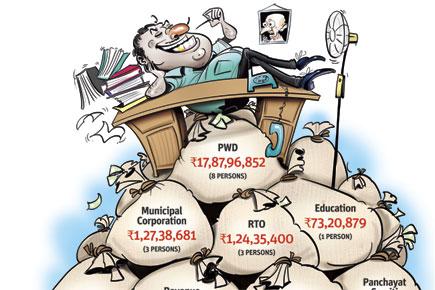According to Anti-Corruption Bureau statistics, the Public Works Department has the most number of officers under the scanner for disproportionate assets in 2013, totalling Rs 17.87 crore

Officers of the Public Works Department (PWD) are the richest among all government sectors in the state when it comes to illegitimate income, says the state’s Anti-Corruption Bureau (ACB).
ADVERTISEMENT

As per the ACB’s records for 2013, eight PWD officials are under the scanner for owning disproportionate assets worth a total of Rs 17. 87 crore. ACB sources said these eight officials had been caught following complaints filed against them by civilians; in some cases, an inquiry was initiated after they were arrested for taking bribes.

Illustration/Amit Bandre
“All the complaints were verified and the officials have been booked for owning assets disproportionate to their salaries. Further inquiries into the matter are currently on,” an inspector from the ACB said. Sources revealed that a PWD posting is a plum one and officials pay hefty amounts to get a job here.
On joining the department, the officials indulge in malpractices to recover the bribe they paid. “An engineer working in PWD has a fixed cut in getting proposals sanctioned. To get their files cleared, contractors and agents pay huge amounts under the table,” said an officer earlier attached to the PWD.
Second place
Second to the PWD are municipal corporations across the state. Inquiry against three officials has unearthed illegitimate assets worth Rs 1.27 crore, while three officials from RTO were booked for owning Rs 1.24 crore in assets.
(See graphic for assets owned by other government officials). The report covers total eight government departments, in which 26 state government employees are involved.
Cops trapped
Policemen, too, aren’t far behind in corruption. Last year, 237 cops were arrested for taking bribes. The amount of trap money involved is Rs 86.43 lakh, while the second in the rank is the Revenue department, with 188 employees arrested.
‘Trap amount’ is the amount in marked notes given by the complainant to the official, who is then caught in the act accepting it. “Most of the time, the trap amount involved is spent by the ACB, as it is evidence in the case. Also, the amount is only the initial or advance payment made by the complainant to the victim.
The actual amount is always double or, at times, triple the actual bribe amount,” an ACB officer added. Despite repeated attempts for a response PWD’s chief engineer, C P Joshi, remained unavailable for comment.

 Subscribe today by clicking the link and stay updated with the latest news!" Click here!
Subscribe today by clicking the link and stay updated with the latest news!" Click here!






